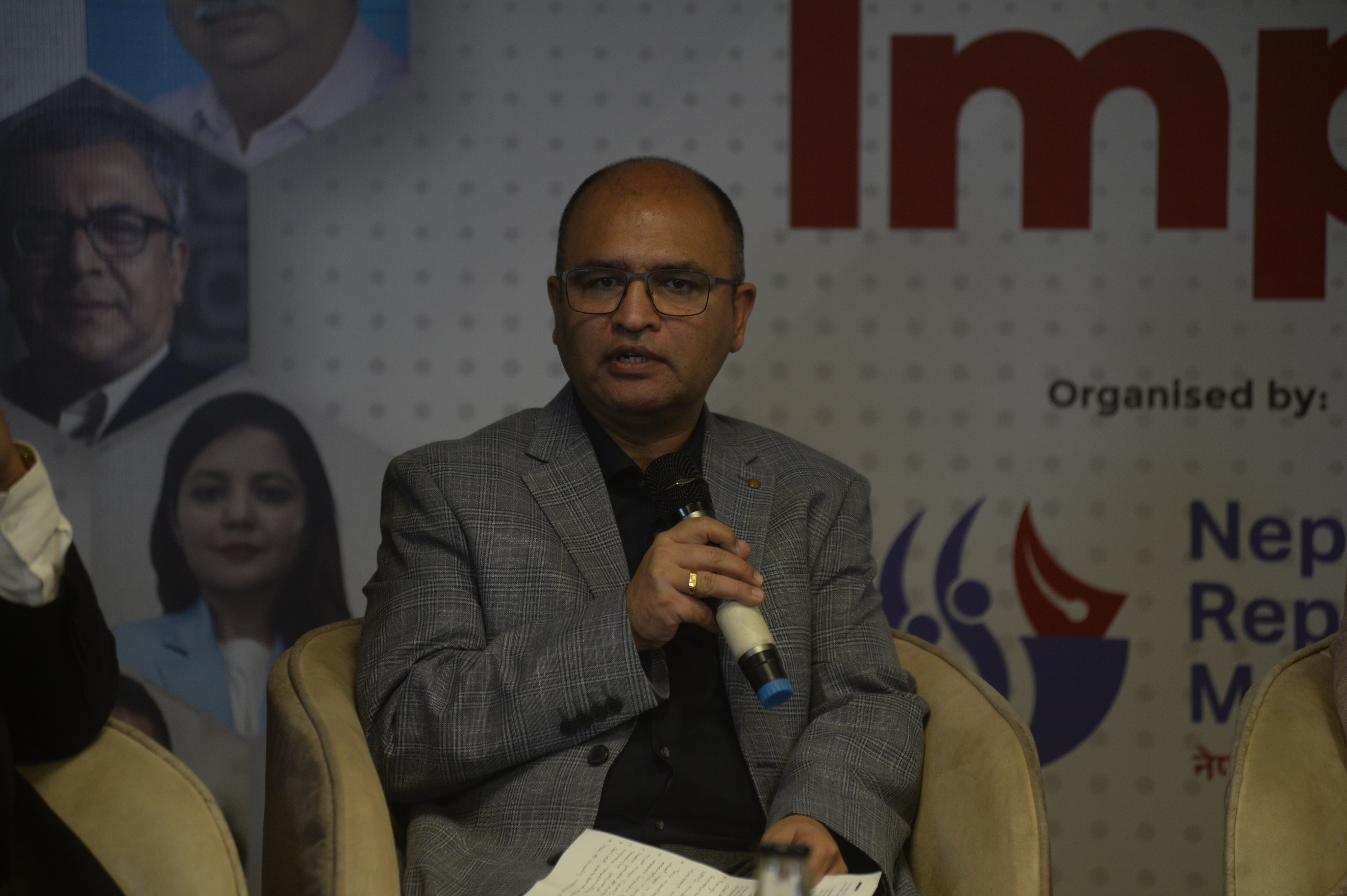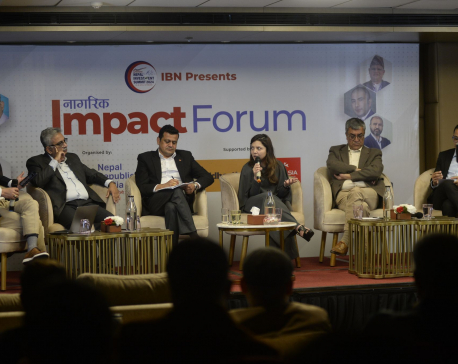
OR
#NagarikImapctForum
'Govt should support IT and green energy investment for economic transformation'
Published On: March 14, 2024 07:35 AM NPT By: Republica | @RepublicaNepal

In 2022, Nepal generated half a billion dollars through IT exports. According to IIDS research, the credibility of experts in the IT industry has increased since then. Out of this half a billion dollars, $300 million was contributed by 67,000 individuals working locally but earning globally through freelancing, while only 106 companies brought in over $200 million. This distribution sheds light on the dynamics of the industry, contributing 1.4 percent to the country's GDP. While multinational companies entered diverse Asian markets, Nepal has remained mired in political chaos. Despite achieving a modest half a billion dollars in exports through formal channels, there is still a lack of effort to enhance the value of exported goods. The current narrative is undergoing a shift, questioning whether the present growth, characterized by local work contributing to global earnings, is indicative of our future. The exploration of this narrative and its contribution to future prosperity is crucial for shaping Nepal's economic trajectory.
In this context, Nepal Republic Media Limited, in partnership with the Investment Board Nepal, organized a panel discussion focusing on exploring the potential of Nepal’s IT sector in propelling the economic growth of Nepal. The panel discussion, moderated by Bal Krishna Joshi, featured Kailash Bijayananda, Vice President of Leapfrog Technology Inc., Anup Upreti from Pioneer Law Associates, Dr. Manish Thapa, Managing Director of Global Equity Fund, Shova Gyawali, President of Federation of Women Entrepreneurs Nepal, and Vishal Mani Upadhyay, Chief Regulatory and Legal Officer at Ncell. Excerpts from the discussions:
‘Govt needs to facilitate institutional growth in the IT sector’

Kailash Bijayananda
Vice President, Leapfrog Technology Inc.
In terms of growth, we aimed for a 50 percent increase, but we only managed to achieve a 20 percent growth. During the COVID-19 pandemic, we successfully doubled both the team size and revenue. Our focus shifted from just making money to fostering maturity. We have implemented policies, rules, and adopted global best practices, establishing a strong foundation for our aspiration to become a billion-dollar company one day.
Within Leapfrog, 25 percent of the workforce consists of women. In engineering schools, with an intake of around 50 students, only five are typically women. As a social contribution, we engage with schoolgirls, teaching them basic coding to spark interest in the IT field. Revenue generation from the informal sector is notably high. However, the challenging environment hinders institutional growth. Tax issues often prompt experts to leave Nepali companies for foreign opportunities where they can increase their income, benefiting from nominal taxes.
While the government aims to boost foreign currency reserves, it does not facilitate institutional growth in the sector, and discouraging freelancing may be one of the measures. Talent acquisition poses a significant challenge, particularly in recruiting and retaining manpower amid the country's tax issues. Additionally, there is a shortage of skilled professionals in the country, leading us to explore other nations with a larger talent pool. Working in Indian cities like Bangalore and Pune has proven easier for recruitment.
We are currently in the initial stages of expanding our business in India, anticipating notable growth there. There is considerable potential to operate data centers in Nepal, with companies like Juniper and Meta expressing interest in green data centers. However, compliance issues arise when foreign companies sign contracts with local firms, and the expenses for clients seeking such companies are substantial. Local companies are encouraged to seek partnerships with Nepali individuals residing abroad.
‘Govt needs to introduce policies to increase participation of women in IT sector’

Shova Gyawali
President, Federation of Women Entrepreneurs Association Nepal
Our success in bringing in significant funds through service-oriented IT businesses has generated hope, especially among the youth in the country. However, attention should be given to the involvement of women in this sector. According to IIDS research, women's participation is currently at only 16 percent. The progress observed during the pandemic reflects the potential of our youths in the IT sector, with informal channels indicating figures as high as $1.5 billion. The challenge lies in formalizing these channels, and the government is required to address this issue, incorporating policies that encourage increased women participation and the return of youth working abroad.
Addressing the involvement and sustainability of women in the IT sector, FWEAN has initiated programs like "Women in Business" and the "Business Development Center" since the pandemic. "Women in Business" focuses on facilitating goods made by women, enabling them to engage in trade from the comfort of their homes. Meanwhile, the "Business Development Center" investigates the number of entrepreneurs, their sectors of involvement, and their business performance, actively maintaining this data. In response to the pandemic's impact, we organized the first-of-its-kind 'Digital Expo' in Nepal. Overall, the IT sector can play a vital role in enhancing and sustaining businesses. Within Nepal Republic Media, 33 percent of the staff are literate in IT.
‘Attracting investment remains a challenge without altering our perspective to see profitable business entities’

Vishal Mani Upadhyay
Chief Regulatory and Legal Officer, Ncell
As one of the two telecom companies, we serve the entire population of the country. Our connectivity infrastructure extends both internally and externally. Additionally, we provide a large-scale data center space to sustain the digital and ICT ecosystem.
There is a need to formulate policies to attract multibillion-dollar companies. From 2018 to 2024, the revenue of telecom companies and ISPs has experienced negative growth, leading to a decline in government revenue from this sector. The focus has shifted to generating income from the adjacent ecosystem. Operating a data center as a business is challenging, and the IT sector has outpaced the telecom sector long ago.
The Telecom Service Act is still under review in parliament, and innovation is expected in the Telco sector. Without altering our perspective to see profitable business entities, attracting investments into the country remains a challenge. Commoditization poses a potential obstacle to the growth of the service sector, including IT.
Ncell currently has no plans to incorporate Fintech. Similar to the global scenario, the Fintech sector is competitive here in Nepal as well. We position ourselves as enablers and aim to support the ecosystem through diverse infrastructure.
‘We are exploring opportunities to leverage green energy, particularly in the IT sector’

Manish Thapa
Principal Managing Partner, Global Equity Fund
In Nepal, venture capital is in its initial stages, not as advanced as seen in India or neighboring countries like Bangladesh. There are criticisms for investing venture capital in businesses such as hotels. As fund managers, our primary role is to function as funding partners. Our clients prioritize security in funding, seeking returns equivalent to or exceeding the interest offered by banks, demanding conformity in returns. This focus on security has limited our ability to meet the requirements of IT businesses. One contributing factor is our lack of risk appetite to date, necessitating a balance in terms of risk management.
Another challenge is offers from exporters making profits from exports but wanting to establish their units in countries like Japan or the UK. Despite our interest in investing in these companies, regulatory constraints prevent us from doing so. Domestically operating companies face market issues and duplication concerns, with many companies working on similar products. The challenge lies in consolidating these efforts, as companies often prefer working individually rather than in collaboration. In some cases, we offer funding under the condition that they come together and operate as a single entity.
Additionally, many local companies heavily rely on pirated software, creating hesitation in investing in genuine software. Profitability remains a challenge for businesses working in the local market. Due to investment restrictions and market limitations outside Nepal, we have not yet achieved the expected market, highlighting the current reality.
As fund managers, we are exploring opportunities to leverage green energy, particularly in the IT sector. Offers for data centers and AI-related companies have been received, but legality concerns persist. Many offers come from individuals with foreign citizenship wishing to set up companies in Nepal. Government procedures, including those of the Department of Industry and challenges related to Section 57, complicate multiple fund-raising efforts in the IT sector. Despite these challenges, we remain open to funding businesses in Nepal.
‘Tax holiday is irrelevant as Nepal functions as a cost center in IT sector’

Anup Upreti
Pioneer Law Associates
When discussing tax regulations, people often overlook policy design. In the IT sector, Nepal functions as a cost center, making tax holidays irrelevant. Even if tax exemptions are granted, many encounter issues with contracts, and the impact on revenue in data centers seems minimal. Strengthening institutions is crucial, with the real challenge for entrepreneurs being fundraising. Numerous countries restrict the establishment of contact offices, posing difficulties for local entrepreneurs accessing markets abroad. Legal complications regarding capital transfer and fundraising, especially with new equity models like sweat equity, add further challenges. Fortunately, the central bank now has an automatic policy, eliminating the need for approval when establishing contact offices. Hence, implementation appears to be smooth.
You May Like This

'Creating a conducive environment crucial for fostering investment'
There is an urgent need to boost both domestic and foreign investments in Nepal to propel economic development and prosperity... Read More...

Experts call for more initiatives to achieve SDGs on safe motherhood and reproductive rights
KATHMANDU, Aug 21: Experts have called for taking more initiatives regarding safe motherhood and reproductive rights by prioritizing economic development... Read More...

Tourism important means for country's economic development: DPM Pokhrel
NAWALPARASI, Feb 1: Deputy Prime Minister and Defence Minister Ishwor Pokhrel today pointed out tourism as an important way to... Read More...



Just In
- Ilam-2 by-elections held peacefully, vote count likely to start tonight
- NEA schedules five-day power cut across Kathmandu Valley for underground cable installation
- Hundreds of passengers including foreign tourists in distress as poor visibility halts flights to and from PRIA
- Nepal clinches thrilling victory over West Indies 'A' in T20 cricket match
- Capital Market Struggle Committee stages protest demanding protection of domestic investors (Photo Feature)
- Captain Paudel scores half-century in T20 match against West Indies 'A'
- Nine youths from Tanahu allegedly joining Russian army out of family contact for months
- West Indies 'A' sets Nepal a target of 205 runs










-1200x560-wm_20240427144118.jpg)




Leave A Comment